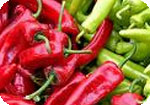The main component in chili peppers- capsaicin is well known for its healingcancer, diabetes, fighting inflammation and pain relief. qualities for diseases like Research has now found that the topical application of a capsaicin cream during a heart attack is linked to preventing or reducing damage to the heart. The researchers found an amazing 85 percent reduction in cardiac cell death when capsaicin was used, and said that it was the most powerful cardioprotective effect recorded.
Study Details
Scientists from the University of Cincinnati applied capsaicin to specific skin locations in mice, and found that it caused sensory nerves in the skin to trigger signals in the nervous system. These signals activate reactions known as cellular "pro-survival" pathways in the heart, which protect the muscle.
The researchers also found that a tiny incision made in the abdomen of the lab rats triggered an 81 percent reduction in the death of heart cells.
The study author explained:
 "Both this and the capsaicin effect are shown to work through similar neurological mechanisms," "These are the most powerful cardioprotective effects recorded to date.
"Both this and the capsaicin effect are shown to work through similar neurological mechanisms," "These are the most powerful cardioprotective effects recorded to date.
"This is a form of remote cardioprotection, using a skin stimulus that activates cardioprotection long before the blocked coronary artery is opened." Capsaicin is the active component of chili peppers and produces a 'hot' sensation because it reacts with the body's pain receptors; this substance is believed to be responsible for its health benefits. Capsaicin is also the active ingredient in several topical medications used for temporary pain relief.
One of the study authors explained how topical capsaicin had no known serious adverse effects, and said:
"If proven effective in humans, this therapy has the potential to reduce injury and/or death in the event of a coronary blockage, thereby reducing the extent and consequences of heart attack."
Research Paper Details:
Jones WK, Fan GC, Liao S, et al. Peripheral Nociception Associated With Surgical Incision Elicits Remote Nonischemic Cardioprotection Via Neurogenic Activation of protein Kinase C Signaling.Circulation, Sep 2009; 120: S1 - S9.
Capsaicin in Chili Peppers Is Heart-Protective
Study Details
Scientists from the University of Cincinnati applied capsaicin to specific skin locations in mice, and found that it caused sensory nerves in the skin to trigger signals in the nervous system. These signals activate reactions known as cellular "pro-survival" pathways in the heart, which protect the muscle.
The researchers also found that a tiny incision made in the abdomen of the lab rats triggered an 81 percent reduction in the death of heart cells.
The study author explained:
 "Both this and the capsaicin effect are shown to work through similar neurological mechanisms," "These are the most powerful cardioprotective effects recorded to date.
"Both this and the capsaicin effect are shown to work through similar neurological mechanisms," "These are the most powerful cardioprotective effects recorded to date. "This is a form of remote cardioprotection, using a skin stimulus that activates cardioprotection long before the blocked coronary artery is opened."
One of the study authors explained how topical capsaicin had no known serious adverse effects, and said:
"If proven effective in humans, this therapy has the potential to reduce injury and/or death in the event of a coronary blockage, thereby reducing the extent and consequences of heart attack."
Research Paper Details:
Jones WK, Fan GC, Liao S, et al. Peripheral Nociception Associated With Surgical Incision Elicits Remote Nonischemic Cardioprotection Via Neurogenic Activation of protein Kinase C Signaling.Circulation, Sep 2009; 120: S1 - S9.
Capsaicin in Chili Peppers Is Heart-Protective
Source :http://www.healthymuslim.com

No comments:
Post a Comment